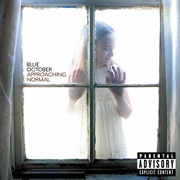Approaching Normal
- Alternative Rock/Adult Contemporary
- 2009
- Buy the CD
Reviewed by Neil Carver
()
Blue October have been described as "in-your-face" on their previous works, and that complete lack of subtlety is evident throughout this disc. This wouldn’t necessarily be a problem if there was anything even remotely inventive in the music or creative lyrically. All the self-righteous anger and angst in the world doesn’t excuse this derivative and often vile and ugly mess.
"Weight of the World" and "Say It" set the tone for the album, both self-pitying rants masquerading as introspection. "Weight…" begins with sampled British dialogue and sirens fading into a whiny rage of post-concert hotel blues that feels like a desperate stab at The Wall: Part 2. Painfully obvious statements like, "Disregarding that I have created these monsters" are spoken and shouted as often as sung. "Say It" carries this same angry howl forward, turning outward in strident defensiveness. The lyrics lash out at some critic (mea culpa?) who chides Justin Furstenfeld as being a "preachy preaching machine" and the whole song is an infantile hands-over-the-ears "la la la I’m not listening to you" retort. "Say It" will probably get airplay, with its radio-friendly guitars and repetitive refrain, but it doesn’t stand up to many repeat listens.
The rest of Approaching Normal falls into a very familiar pattern: Songs of self-loathing turned outward, blaming and finger-pointing like a 10-year-old at perceived tormentors. There is a focus on Furstenfeld’s aching growl of a voice and plaintive screams that are unfortunately reminiscent of Dave Matthews on a bender. "Dirt Room" is an adolescent revenge fantasy against the Madoffs of the world, and while it has the single best lyric on the album, the song comes across as nothing more than frustrated foot-stomping of a child mad at the mean grownups.

Much of the record is simply forgettable. When they try to break the angst mold, it feels forced at best -- "Blue Skies" and "Blue Does" are a very odd pair of songs. "Blue Skies" is a boppy, pop piece with orchestration and hand clapping that is frankly bizarre and unsettling in its own right. If it was a tongue-in-snarling-cheek cover of a Beach Boys’ tune one could dig the irony, but this seems to be an original attempt at lighthearted, but is more dumbfounding than anything. "Blue Does" is just a riff on Ben Fold’s "Gracie" without any of the intimacy and pathos of that classic.
In the end, Furstenfeld’s true nature shows through, coming out in a graphic and disturbing way. On the overly apt "The End" he snarls and moans and screams out a disgusting play-by-play of a spurned lover committing a triple murder/suicide. There is nothing revelatory or introspective about it. Exposing the grim and awful side of human nature is always fodder for modern rock and roll, but such obsessive and grueling details as provided in "The End" are nothing more than pandering to the misanthropic violence of the maladjusted. It is sad irony that this was released during the anniversary month of the most recorded acts of mass murder/gun killings in US history, but just because Blue October may be tapping into a dark and horrific sliver of the collective American consciousness doesn’t make it good music in the least.
You can follow us on Twitter and Facebook for content updates. Also, sign up for our email list for weekly updates and check us out on Google+ as well.













